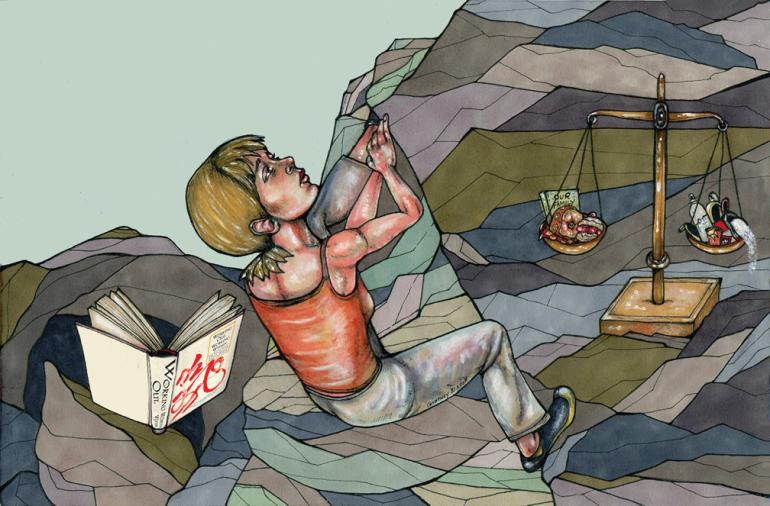Lesson of Balance
There's no denying the humble enchantment of the mock-Bavarian village in Leavenworth, Washington. It's a blatant tourist trap, but a lovely one—fake lederhosen and all. More important, the granite boulders nestled in the plush forest nearby offer quality climbing, especially for those with V5 to V7 ability.
Beth and I had planned our trip to Leavenworth as an all-girl climbing endeavor, something I'd wanted to do since I began bouldering two years earlier. After heading west to pick up Beth en route in Missoula, we would drive five hours to the beautiful fairyland of central Washington.
But on the way to Missoula, I received a phone call from my mother. Grandma had fallen down and broke her hip, she said. Grandma turned 92 that year, and her recovery was doubtful.
Swear words flooded my mind as I processed the news. I hadn't seen Grams for three years, which was a direct consequence of falling in love with climbing. I had consistently opted for climbing trips the past couple of years instead of family reunions. Time off of work or school was for trips to Bishop, Joe’s, Cody, Leavenworth—not Grand Rapids, Minnesota.
The guilt set in. The contrast between my selfish climbing-bum existence and a family-oriented lifestyle became glaringly obvious. Had climbing consumed me to the point of desolate apathy toward my own grandmother’s impending death?
First I tried to bargain with myself to avoid canceling the trip. “Aw, she’s tough,” I thought; or, “What would I possibly have to offer in this situation?”
But when I met Beth for coffee in Missoula, she completely understood. The right choice was, of course, obvious. I itched with a nagging letdown as I drove back to Bozeman.
The trip quickly took on a new form: 17 hours in the car with my mother. Questions like, “What are you doing with your life?” and, “Will climbing provide financial security in the long haul?” surfaced on the prairie of North Dakota. I tried to sleep most of the way, but the probing questions broke the silence.
The tension waned as Minnesota rose out of the prairie in thick, emerald forest. Pine trees, tall and neighborly, line the road without foreseeable end. This is the land of wolves, wolverines, deer, elk, moose, and black bear. There will be roadkill. Most of all, there will be lakes.
Entering the land of my childhood summers reminded me of swimming in cold water on humid summer evenings. It reminded me of mosquitoes and fireflies, northern pike and leeches. It reminded me of why I was there—my grandma. Memories flooded my mind like the brimming waters of spring lakes.
The past three years of climbing suddenly felt distant, and the first 20 years of my life took rein. I remembered how it felt to be carefree, to be surrounded by relatives who fed me strawberry shortcake and baked ham with pineapples. Climbing was suddenly not as important as it was 300 miles ago. Being away from rocks, mountains, and the training gym suddenly felt like a relief, not an inconvenient detour.
We arrived at the rehab center. The nostalgia soon dimmed in the darker reality I needed to face.
I last saw my grandma before dementia and fragility took over. My mom spotted her first; I didn't even recognize her. She sat alone in a wheelchair, gazing out the window across a cup of soup and a half-eaten sandwich. I gave her a gentle hug.
“Who are you?” she asked.
We sat and urged her to finish her lunch. Every two minutes she tried to sit up, and every two minutes she was surprised by the pain in her hip. We reminded her it was broken and that she wouldn't be able to stand for a while. Each time, she had a different reaction. “Oh, you liars!” she would say, or “Great! Just what I needed!” Despite the dementia, she still had her Irish spunk.
For a week we returned to the rehab center at mealtimes to make sure she ate. Her moods ranged from lost and confused to bemusement with her somewhat familiar company. She persistently tried to sit up or take out her oxygen tube.
I always left exhausted and irritable. It was a new kind of workout, one that exercised my patience and emotional strength.
Climbing never left my consciousness, however. I ran and practiced yoga to keep in shape. I shifted my view of the week from inconvenient delay to an opportunity for physical regeneration and meditation. I read a book called Working Out, Working Within: The Tao of Inner Fitness Through Sports and Exercise. One of the chapters, titled “The Wisdom of Non-Excessiveness,” describes the dangers of overdoing a sport at the expense of spiritual wellness and physical longevity.
“Excessiveness, in a spiritual sense,” the book says, “is a cancer of the soul. It knocks you off balance, forces you to lose perspective on what’s important, and destroys your value structure at the cellular level.”
“When the disease of excessiveness goes into remission,” it continues, “you begin to feel the physical, emotional and spiritual side effects. Motivation increases, while excitement, joy, enthusiasm, and satisfaction return. It brings you back, once again, to the pure spirit of play.”
For many of us, sports are the center of our lives. I think for many outdoor athletes the temptation to overindulge is dangerously compelling. It is often hard not to—given how fun our sports and their respective lifestyles can be. But to imagine not seeing my grandma before she passed filled me with deep remorse. Despite my initial reluctance, the trip actually improved the mental capacities that climbing demands and helped me see what really mattered.
Ultimately, the rocks will be around longer than we will. Grandmas, however, are fleeting.






